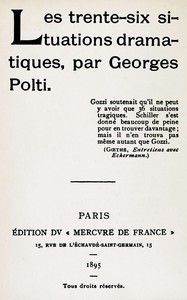| Author |
Polti, Georges, 1867-1946 |
| LoC No. |
06004237
|
| Title |
Les trente-six situations dramatiques
|
| Alternate Title |
Les 36 situations dramatiques
|
| Original Publication |
Paris: Mercure de France, 1895.
|
| Note |
Reading ease score: 63.7 (8th & 9th grade). Neither easy nor difficult to read.
|
| Credits |
Laurent Vogel and the Online Distributed Proofreading Team at https://www.pgdp.net (This book was produced from scanned images of public domain material from the Google Books project.)
|
| Summary |
"Les trente-six situations dramatiques" by Georges Polti is a theoretical work on drama written in the late 19th century. The book explores the concept that there are a finite number of dramatic situations that underpin all narratives, specifically positing that there are thirty-six fundamental situations that can be identified in theatrical and literary works. Polti's analysis serves as a framework for understanding the emotional and narrative structure of stories across various cultures and time periods. The opening of the work presents this foundational argument by referencing earlier theorists such as Gozzi and Schiller, who similarly engaged with the notion of dramatic categories. Polti introduces these thirty-six situations, beginning with the first: "Implore," where complex emotional dynamics unfold between a persecutor, a supplicant, and an ambiguous powerful figure. The text outlines how these situations encompass a range of human experiences and emotions, ultimately suggesting that these archetypes not only inform theater but reflect universal human interactions. (This is an automatically generated summary.)
|
| Language |
French |
| LoC Class |
PN: Language and Literatures: Literature: General, Criticism, Collections
|
| Subject |
Drama -- Technique
|
| Subject |
Plots (Drama, novel, etc.)
|
| Category |
Text |
| EBook-No. |
72036 |
| Release Date |
Nov 5, 2023 |
| Copyright Status |
Public domain in the USA. |
| Downloads |
97 downloads in the last 30 days. |
|
Project Gutenberg eBooks are always free!
|

